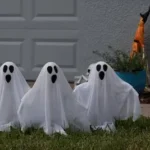- Demonic possession dreams are not literal representations of evil, but instead symbolize inner struggles and fears in our waking life.
- Common scenarios in these dreams include being possessed, exorcism, saving others from possession, and fighting demons, each with its own symbolic significance.
- The characters in these dreams, such as the demon, exorcist, and possessed person, hold important clues to their meaning, representing fears, strengths, and concerns.
- To better understand these dreams, keep a dream journal, reflect on your waking life, explore your emotions, and seek professional help if needed.
Dreaming about demonic possession can be a puzzling and unsettling experience. These dreams often leave us feeling fearful and confused. But fear not, as these nightmares can hold valuable insights into our subconscious mind. In this article, we will explore the symbolism, common scenarios, and characters in demonic possession dreams, helping you decode their meaning and uncover hidden insights. Let’s dive in.
Interpreting Demonic Possession Dreams
1. Symbolism of Demonic Possession Dreams
Demonic possession dreams are not always literal representations of evil or negative influences. Instead, they often symbolize inner struggles and fears that we may be grappling with in our waking life. These dreams can be a reflection of repressed emotions, negative aspects of ourselves, or unresolved conflicts. Pay attention to the specific symbols and emotions present in your dream to uncover their deeper meaning.
2. Common Dream Scenarios of Demonic Possession
Dreams about demonic possession can manifest in various scenarios, each with its own symbolic significance. Here are some of the most common scenarios and their possible interpretations:
- Being Possessed
If you dream of being possessed by a demon, it may symbolize a loss of control in your life. This could be related to a situation or behavior where you feel helpless and unable to break free. - Exorcism
Dreaming of an exorcism can suggest a desire to rid yourself of negative energies or influences. It may signify your determination to confront and overcome personal challenges or destructive habits. - Saving Others from Possession
If you dream of rescuing someone from demonic possession, it may indicate your empathetic and nurturing nature. This dream could reflect your desire to help others overcome their struggles or provide support in difficult times. - Fighting Demons
Engaging in battle with demons in your dream signifies your inner strength and resilience. It shows your determination to overcome obstacles and conquer your fears. This dream encourages you to face challenges head-on and tap into your inner power.
3. Demonic Dream Characters and What They Signify
In demonic possession dreams, the characters that appear can hold important clues to their meaning. Here are some common demonic dream characters and their possible interpretations:
- The Demon
The demon in your dream represents your inner fears, negative aspects, or repressed emotions. It may symbolize the challenges or temptations you face in your waking life. Pay attention to its appearance and behavior, as different demons can have distinct meanings. - The Exorcist
If an exorcist appears in your dream, it signifies your inner strength and determination to overcome challenges. This character represents your ability to confront and banish negative influences from your life. - The Possessed Person
Dreaming of someone being possessed may reflect your concern for their well-being or a perceived loss of control within that relationship. It is important to consider the emotions and dynamics involved to gain deeper insight into your dream.
4. Tips for Decoding Your Demonic Possession Dreams
To better understand and decode your demonic possession dreams, consider the following tips:
- Keep a Dream Journal
By recording your dreams in a journal, you can identify patterns, symbols, and emotions that reoccur. This will help you make connections and gain a deeper understanding of your dreams over time. - Reflect on Your Waking Life
Pay attention to any current challenges, conflicts, or negative emotions you may be experiencing. Your dreams may be attempting to bring these issues to your attention and provide guidance for resolution. - Explore Your Emotions
Identify the emotions present in your dream and reflect on how they relate to your waking life. Are there any repressed feelings or unresolved conflicts that need attention? Explore these emotions and seek ways to address them in a healthy manner. - Seek Professional Help
If your dreams about demonic possession are causing significant distress or interfering with your daily life, consider seeking guidance from a mental health professional. They can provide valuable insight and support in navigating these dreams and any underlying issues.
Psychological Analysis of Demonic Dreams

Dreams have long intrigued and fascinated us, offering glimpses into the mysterious realm of our subconscious minds. And when it comes to dreams about demons, they can be particularly unsettling and puzzling. But what do these dreams mean? Are they a sign of something sinister or simply a reflection of our inner struggles and fears? In this section, we will delve into the psychological interpretations of these dreams, exploring key perspectives and shedding light on the hidden meanings they may hold.
1. Carl Jung’s Perspective on Demonic Dreams
One prominent figure in the field of psychology, Carl Jung, offered valuable insights into the symbolism and significance of dreams, including those involving demons. According to Jung, dreams are a gateway to our unconscious minds, a way for our inner selves to communicate with us. In the case of demonic dreams, Jung believed that they often stem from our fears and anxieties, which we may be repressing or denying in our waking life.
Jung saw demons in dreams as representations of our shadow self, the dark and unknown aspects of our personality that we may struggle to accept or understand. These dreams can serve as a reminder to confront and integrate our shadow self, to acknowledge the parts of ourselves that we may have neglected or pushed away. By doing so, we can achieve a sense of wholeness and self-awareness.
2. The Link Between Demonic Dreams and Repressed Emotions
Another interpretation of demonic dreams is that they reflect repressed emotions or negative aspects of ourselves that we may be suppressing. These dreams can be seen as a symbol of the unresolved anger, guilt, or fear that we may not be acknowledging in our waking life. The demons in our dreams represent these buried emotions, demanding our attention and urging us to confront them.
These dreams can be a powerful invitation to delve deeper into our subconscious, to explore the root causes of our emotional turmoil. By acknowledging and processing these repressed emotions, we can experience healing and personal growth.
3. Understanding the Symbolism: Types of Demons in Dreams
The types of demons that appear in our dreams can also hold significant symbolic meaning. For instance, a horned demon may represent anger or aggression, while a serpent demon may symbolize temptation or hidden desires. By paying attention to these details, we can gain further insight into the specific emotions or issues we may be grappling with.
Here is a breakdown of some common types of demons and their symbolic interpretations:
| Type of Demon | Symbolic Interpretation |
|---|---|
| Horned Demon | Anger, aggression |
| Serpent Demon | Temptation, hidden desires |
| Possessive Demon | Feelings of helplessness, loss of control |
| Human Demon | Emerging threats, deception, or unresolved guilt |
| Devil | Self-reflection, internal conflict, personal growth |
It’s important to remember that the interpretation of these symbols may vary from person to person, as our dreams are deeply personal and unique to our individual experiences.
4. Unraveling the Meanings: Insights and Reflections
Demonic dreams may be unsettling, but they serve a purpose in our personal growth and self-discovery. By exploring the symbolism and hidden meanings behind these dreams, we can gain valuable insights into our psychological well-being and uncover unresolved issues that may be holding us back.
These dreams often act as a call to action, urging us to confront our inner struggles and fears head-on. By acknowledging and processing our repressed emotions, integrating our shadow self, and accepting our flaws and vulnerabilities, we can experience personal transformation and find a sense of inner peace.
Cultural and Religious Interpretations of Demonic Dreams

Dreaming about demons can be a powerful and deeply unsettling experience. Across different cultures and religions, there are various interpretations of these dreams, reflecting unique beliefs and perspectives on the spiritual realm. In this section, we will explore both Western and Eastern interpretations of demonic dreams.
1. Western Interpretations of Demonic Dreams
In the Western worldview, dreams have often been associated with psychological states and personal experiences. When it comes to demonic dreams, these interpretations focus on the inner struggles and fears of the dreamer. Here are some key points to consider:
- Psychological Symbolism
Demons in dreams are often seen as representations of repressed emotions or negative aspects of the dreamer’s self. They can embody feelings of anger, guilt, or fear that are not acknowledged in waking life. - Struggles and Confrontations
Demonic dreams may signify difficult times and conflicts in the dreamer’s life. They symbolize strife and disruption and can serve as a reflection of unresolved issues that need attention and resolution. - Loss of Control
Dreams featuring demons can indicate a loss of control in one’s life. These dreams may suggest that the dreamer is feeling helpless or overwhelmed, particularly if the dream depicts possession. It is a reminder to examine the factors causing stress and to take responsibility for one’s actions. - Difficulties in Relationships
Demonic dreams can symbolize difficulties in relationships, particularly in romantic involvements. These dreams may indicate trouble in real-life relationships and can be a call to open up communication, address underlying issues, or seek sexual satisfaction.
2. Eastern Interpretations of Demonic Dreams
In Eastern cultures, such as Buddhism and Islam, dreams have a significant place in spiritual practice and understanding. Interpretations of demonic dreams in these traditions provide unique insights into the human psyche and the connection with the divine. Here are a few points to consider:
- Buddhist Perspective
In Buddhism, dreams are seen as opportunities for self-reflection and gaining wisdom. Demonic dreams can be seen as a reflection of internal struggles and obstacles on the spiritual path. They serve as reminders to cultivate inner strength, overcome negative influences, and deepen one’s connection with the divine. - Islamic Beliefs
In Islam, dreams hold special significance and are believed to provide insight into future events and spiritual encounters. Demonic dreams can be interpreted as warnings, messages, or tests from the divine. They may indicate the need for spiritual growth, seeking forgiveness, or protecting oneself from negative influences.
3. Other Cultural and Religious Interpretations
Apart from Western and Eastern interpretations, various other cultural and religious beliefs provide insights into the meaning of demonic dreams:
- Native American Cultures
Native American traditions view dreams as a means of communication with the spirit realm. Demonic dreams in these cultures may represent encounters with the supernatural or serve as reminders to strengthen one’s connection with the natural world [1]. - Hinduism
Within Hinduism, dreams are considered to be divine messages and reflections of one’s karma. In the context of demonic dreams, they may signify karmic lessons, spiritual challenges, or the need for self-reflection and growth.
These interpretations offer different lenses through which to understand the spiritual meaning of demonic dreams. It is essential to consider one’s cultural and religious background to fully grasp the significance of these dreams within a broader context.
Guidance for Dealing With Demonic Dreams

If you have been experiencing demonic dreams or nightmares, it is essential to address them in a healthy and constructive manner. Here are some steps you can take to navigate these experiences and find peace:
- Acknowledge Your Feelings
It is completely normal to feel frightened, disturbed, or confused after having a demonic dream. Take the time to acknowledge and process your emotions. Remember, these dreams do not define who you are as a person. - Seek Emotional Support
Reach out to trusted friends, family members, or a counselor to discuss your dreams and any ongoing emotional distress you may be experiencing. Having someone to listen and offer support can help alleviate anxiety and provide perspective. - Pray and Meditate
Turn to your faith or spiritual beliefs for solace and guidance. Praying and meditating can help calm your mind and bring a sense of peace. Focus on positive affirmations and visualize yourself protected and surrounded by divine light. - Take Control of Your Thoughts
Be mindful of your thought patterns throughout the day. If negative or fearful thoughts arise, consciously redirect your focus to more positive and uplifting thoughts. This practice can help minimize the impact of negative dreams on your overall well-being. - Create a Dream Routine
Establish a calming and relaxing routine before bed to promote peaceful sleep. This may include activities such as deep breathing exercises, reading uplifting material, or listening to soothing music. Avoid watching or engaging with disturbing content before bedtime. - Develop Healthy Sleep Habits
Ensure that you are getting enough sleep and practicing good sleep hygiene. Maintain a consistent sleep schedule, create a comfortable sleep environment, and avoid consuming caffeine or heavy meals close to bedtime. Quality rest can help reduce the intensity of dreams. - Journal Your Dreams
Consider keeping a dream journal to record your experiences. Write down the details of your dreams, including any symbols or emotions that stood out. This practice can help you gain insight into recurring themes or patterns and provide material for further reflection. - Practice Self-Care
Engage in activities that promote self-care and relaxation. This may include exercise, spending time in nature, engaging in hobbies you enjoy, or practicing mindfulness and self-compassion. Taking care of your overall well-being can have a positive impact on your dream experiences. - Consider Professional Help
If you are consistently experiencing distressing or recurrent demonic dreams, it may be beneficial to seek professional help from a therapist or counselor. They can provide guidance, coping strategies, and support tailored to your specific needs. - Stay Grounded in Reality
Remember that dreams are not always a reflection of reality. Although demonic dreams can be unsettling, they are often symbolic representations of underlying emotions or conflicts. Focus on living in the present moment and grounding yourself in your daily reality.
Dreams are complex and often reflect the subconscious mind. Demonic possession dreams can be terrifying, but they can also provide insight into our deepest fears and desires. By reflecting on the symbols and characters in these dreams, and exploring our emotions and experiences in waking life, we can begin to decode their meaning. Keeping a dream journal, talking to friends or a therapist, and finding healthy ways to cope with stress can also help us work through any inner struggles that these dreams may be bringing to light. Ultimately, these dreams can teach us about ourselves and the world around us, and provide an opportunity for growth and self-discovery.










Leave a Reply